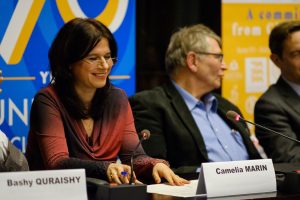[vc_row][vc_column][vc_column_text]Soteria International:
A civil society commitment
 It is with hope that we are here today, celebrating the UDHR’s 70th birthday in a collective commitment, not as governments but as civil society – as humans standing for the humane.
It is with hope that we are here today, celebrating the UDHR’s 70th birthday in a collective commitment, not as governments but as civil society – as humans standing for the humane.
In Soteria International we engage ourselves in the freedom of thought, conscience and belief. This Saturday we hosted an international conference in Copenhagen, on a similar theme as we have here.
It seems that at the UDHR 70th birthday we are still at a crisis of society. In so many different ways people are protesting, in a health or unhealthy ways. Civil society commitment and true human rights activism will bring in the end a change of culture.
True Human Rights activism is not about protesting against how some countries respect the HR or not, but how to include HR at the very core of our society. The breaches are the cultures allowing them to happen. We all know that religions are champions of suppressing religious freedom. The civil society commitment must be a cultural upgrade. Governments administrate cultural values, but they do not create them. It is the cultures that live inside us, influence our consciousness and impart our decisions.
We live in a culture that allows breaches of human rights, because we as human do not properly understand or integrate the human rights into what it is to be human. Just as mentioned in the preamble of the UDHR, the focus on HR activism must be education, to upgrade our society into internalising and embody the human rights. Civil society should shoulder this change of paradigm in working with human rights from fighting governments for maximizing different freedoms, such as freedom of speech, into cultivating a humane society where human rights are internalised, so that people will stop harming each other in their free speech. Human rights activists should be experts and teachers of what it means to be human. Then Human Rights would be the backbone of society, affirming the inherent dignity and of the equal and inalienable rights of all members of the human family is the foundation of freedom, justice and peace in the world.
Let us zoom out and see the whole picture. How does new technology influence our lives? Does it globally serve human life or mostly economy? If the latter – how could we get there? If the Human Rights are not directing the development of our lives, it is not enough operational. In any system, what is not practical, is in time, decaying.
Human Rights risk the same fate, if it does not become operational at a direct human level. What has a practical value will live and grow, what does not have a practical value will die.
Often we will find ourselves complaining that the Human Rights are not given enough attention by humans and human systems, such as governments. But do they have practical value for human lives? Only then will it be taken into consideration and from there blossom free and natural.
As always pointed out – education is the key. But not education in the human rights as such, but , should be education and research in developing the human position in its environment, to discover the human values.
Ecology matters because it refers to a whole, and that is why people today are obsessed with it.
As different inhumane behaviour is increasingly subversive to the human dignity and rights, could we not imagine a similar rise of awareness in the human rights, making it operational within our cultures? What are human values and virtues? Understanding the acute need to internalising these aspects will bring the Human Rights alive.
To stand for our human rights should be an inner rioting against letting injustices pass unnoticed inside us, learning to act to mend it in and between us.
Protesting by burning cars is the protest of the past. Being a true human rights activist is the way of the future.[/vc_column_text][/vc_column][/vc_row][vc_row][vc_column][vc_video link=”https://www.youtube.com/watch?v=aAKvUT_44LA&feature=youtu.be” title=”Soteria International United Nations Camelia 70th A Commitment from Civil Society”][/vc_column][/vc_row]


